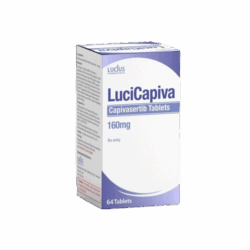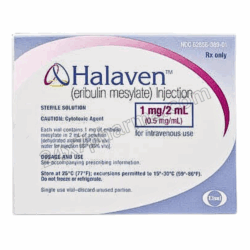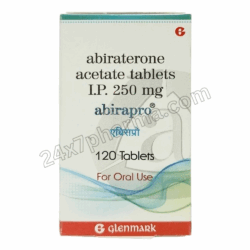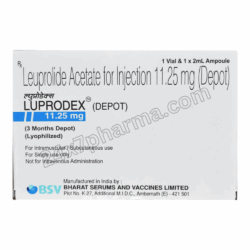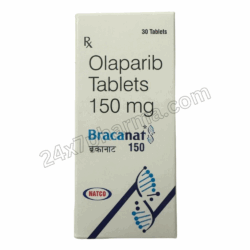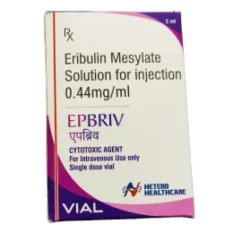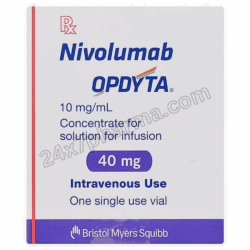LuciCaboz 20mg, Cabozantinib Tablets
Cabozantinib, marketed under the brand name Cabometyx, is an oral tyrosine kinase inhibitor (TKI) utilized in oncology. It targets multiple receptor tyrosine kinases, including MET, VEGFR2, AXL, RET, and FLT3, which are implicated in tumor growth, angiogenesis, and metastasis. Cabometyx 20 mg tablets are specifically indicated for certain cancers and are part of a broader treatment regimen.
What is LuciCaboz 20 mg (Cabozantinib)?
Cabometyx, a tyrosine kinase inhibitor (TKI) and targeted cancer medication, is present in LuciCaboz 20 mg. It worksby blocking certain proteins (kinases) that promote cancer cell growth, spread, and blood vessel formation. It is primarily used to treat advanced forms of kidney cancer (RCC), liver cancer (HCC), thyroid cancer, and some neuroendocrine tumors.
Mechanism of Action
- Cabozantinib exerts its therapeutic effects by inhibiting several receptor tyrosine kinases:
- MET: Involved in tumor cell proliferation and survival.
- VEGFR2: Plays a crucial role in angiogenesis, the formation of new blood vessels that supply tumors.
- AXL, RET, FLT3: Contribute to tumor progression and metastasis.
- By blocking these pathways, cabozantinib impedes tumor growth and spread.
Indications
Cabometyx 20 mg is approved for the treatment of:
Advanced Renal Cell Carcinoma (RCC): Particularly in patients who have received prior antiangiogenic therapy.
Hepatocellular Carcinoma (HCC): For individuals who have previously been treated with sorafenib.
Differentiated Thyroid Cancer (DTC): In cases that are radioactive iodine-refractory and have progressed following VEGFR-targeted therapy.
Extra-pancreatic neuroendocrine tumors (epNET) and pancreatic neuroendocrine tumors (pNET): In patients 12 years of age and older who have had prior treatment for an incurable, locally progressed, or metastatic disease.
Side Effects
Common adverse reactions include:
- Diarrhea
- Fatigue
- Palmar-plantar erythrodysesthesia (PPE)
- Decreased appetite
- Hypertension
- Nausea and vomiting
- Weight loss
- Constipation
Serious adverse reactions may include:
- Hemorrhage
- Gastrointestinal perforations or fistulas
- Arterial thromboembolic events
- Reversible posterior leukoencephalopathy syndrome (RPLS)
- Osteonecrosis of the jaw
- Nephrotic syndrome
- Hypertensive crisis
Patients should be monitored for these adverse effects, and dose adjustments or discontinuation may be necessary based on severity.
Storage
- Cabometyx tablets should be kept between 20°C and 25°C (68°F and 77°F) at room temperature.
- Keep the drug well sealed in its original container, away from moisture and light.
- Keep out of children’s and pets’ reach.
Drug Interactions
-
- Cabozantinib is metabolized by the CYP3A4 enzyme. Co-administration with certain drugs can affect its efficacy and safety:
- Strong CYP3A4 Inhibitors (e.g., ketoconazole, itraconazole): May increase cabozantinib levels; consider dose reduction.
- Strong CYP3A4 Inducers (e.g., rifampin, carbamazepine): May decrease cabozantinib levels; consider dose increase.
- Avoid consuming grapefruit and grapefruit juice since they may raise cabozantinib levels.
- St. John’s Wort: May decrease cabozantinib levels; avoid use.
- Always inform healthcare providers of all medications being taken to assess potential interactions.
- Cabometyx offers several advantages in cancer treatment:
- Efficacy: Demonstrated significant improvements in overall survival and progression-free survival in clinical trials for RCC and HCC.
- Targeted Therapy: Inhibits multiple pathways involved in tumor growth and metastasis.
- Convenient Oral Administration: Taken once daily without the need for hospitalization.
Precautions and Contraindications
Cabometyx should be used with caution in:
- Patients with a history of gastrointestinal perforations or fistulas.
- Individuals with uncontrolled hypertension.
- Patients with a history of arterial thromboembolic events.
- Those with impaired liver function.
- It is contraindicated during pregnancy and breastfeeding due to potential harm to the fetus and infant.
FAQS
Are there any dietary restrictions?
Steer clear of grapefruits and their juice, as they may raise cabozantinib levels. St. John’s Wort might lower its levels, so stay away from it as well.
Is Cabometyx suitable for pediatric patients?
Its effectiveness and safety in young patients are unknown. Use in individuals under 18 years is not recommended unless specifically prescribed by a healthcare provider.
Any dietary restrictions?
Yes, avoid grapefruit products and St. John’s Wort.
Is it safe for children?
Not generally recommended unless prescribed by a specialist.
Conclusion
Cabozantinib (Cabometyx) 20 mg is a targeted therapy that plays a significant role in the treatment of various cancers, including advanced renal cell carcinoma, hepatocellular carcinoma, differentiated thyroid cancer, and certain neuroendocrine tumors. Its mechanism of action involves inhibiting multiple receptor tyrosine kinases involved in tumor progression. While it offers substantial benefits in terms of efficacy, careful consideration of dosing, potential side effects, and drug interactions is essential for optimal patient outcomes. Patients should maintain open communication with their healthcare providers to manage treatment effectively.



